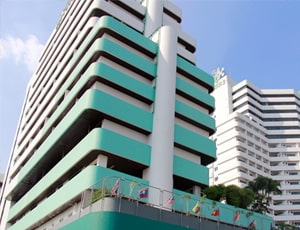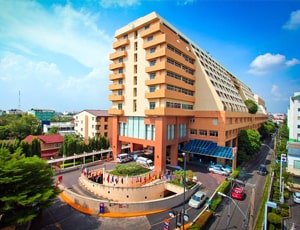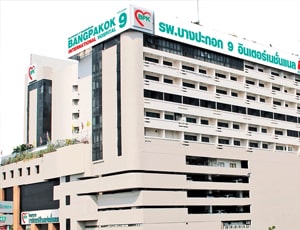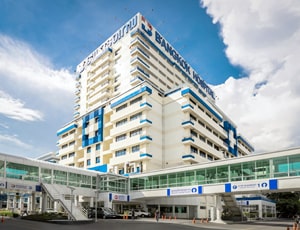The average cost of Oral cancer Treatment in Bangkok approximately starts from USD 9500
Treatment cost

Types of Oral cancer Treatment in Phyathai 2 International Hospital and its associated cost
| Treatment Option | Approximate Cost Range (USD) | Approximate Cost Range (THB) |
|---|---|---|
| Oral Cancer Treatment (Overall) | 2274 - 16978 | 79355 - 598527 |
| Surgery | 5528 - 13317 | 197589 - 476636 |
| Chemotherapy | 342 - 1132 | 12234 - 40234 |
| Radiation Therapy | 554 - 1361 | 20410 - 48829 |
| Targeted Therapy | 2247 - 8928 | 81117 - 324239 |
| Immunotherapy | 3304 - 10216 | 121085 - 365541 |
| Palliative Care | 338 - 898 | 11872 - 32587 |
| Dental Procedures | 671 - 2247 | 23816 - 81615 |
| Reconstructive Surgery | 5692 - 15973 | 204913 - 562987 |

Types of Oral cancer Treatment in Vejthani Hospital and its associated cost
| Treatment Option | Approximate Cost Range (USD) | Approximate Cost Range (THB) |
|---|---|---|
| Oral Cancer Treatment (Overall) | 2241 - 16628 | 80659 - 604730 |
| Surgery | 5561 - 13553 | 197966 - 485713 |
| Chemotherapy | 341 - 1137 | 11970 - 40793 |
| Radiation Therapy | 572 - 1342 | 19859 - 49060 |
| Targeted Therapy | 2248 - 8897 | 79334 - 320694 |
| Immunotherapy | 3359 - 10050 | 118196 - 358873 |
| Palliative Care | 333 - 893 | 12299 - 32709 |
| Dental Procedures | 682 - 2229 | 24322 - 79227 |
| Reconstructive Surgery | 5580 - 15659 | 197283 - 568309 |

Types of Oral cancer Treatment in Bangpakok 9 International Hospital and its associated cost
| Treatment Option | Approximate Cost Range (USD) | Approximate Cost Range (THB) |
|---|---|---|
| Oral Cancer Treatment (Overall) | 2276 - 16770 | 79617 - 608066 |
| Surgery | 5713 - 13203 | 200004 - 490818 |
| Chemotherapy | 340 - 1128 | 11974 - 40446 |
| Radiation Therapy | 552 - 1339 | 20045 - 48972 |
| Targeted Therapy | 2279 - 9068 | 79495 - 323165 |
| Immunotherapy | 3420 - 10117 | 121482 - 353791 |
| Palliative Care | 335 - 920 | 11979 - 31729 |
| Dental Procedures | 679 - 2202 | 24463 - 80188 |
| Reconstructive Surgery | 5740 - 15795 | 200048 - 565391 |


Types of Oral cancer Treatment in Bangkok Hospital and its associated cost
| Treatment Option | Approximate Cost Range (USD) | Approximate Cost Range (THB) |
|---|---|---|
| Oral Cancer Treatment (Overall) | 2230 - 17091 | 78728 - 604383 |
| Surgery | 5708 - 13794 | 204309 - 486171 |
| Chemotherapy | 341 - 1107 | 11912 - 39406 |
| Radiation Therapy | 558 - 1336 | 20458 - 48763 |
| Targeted Therapy | 2241 - 9173 | 80891 - 327160 |
| Immunotherapy | 3411 - 9963 | 120915 - 361480 |
| Palliative Care | 340 - 906 | 12174 - 31485 |
| Dental Procedures | 677 - 2254 | 24148 - 81878 |
| Reconstructive Surgery | 5742 - 15775 | 199694 - 558324 |
Oral cancer, commonly referred to as mouth cancer or throat cancer, is an uncontrollable growth of cells in the oral cavity. It refers to cancer that develops in any of the parts that make up the mouth. It can include cancer of the lips, tongue, cheeks, the floor of the mouth, pharynx (throat), hard and soft palate, and either of the sinuses. Mouth and oropharyngeal cancer can be life-threatening, but it could be prevented if the cancer is diagnosed early enough.
Oral cancer is a result of a mutation in the DNA of the cells in the mouth. Certain identified risk factors for mouth cancer predisposes a person to oral cancer.
There are some typical signs of mouth cancer that a majority of patients experience. Make sure to visit your doctor or dentist in case you experience any of the following signs of mouth cancer:
Oral cancer treatment is similar to that for other types of cancers. You may have to go for just one type of treatment or a combination of different cancer treatment options. Your doctor will suggest you the most suitable treatment depending on the location of cancer, its stage, and your overall health status.
Ask your healthcare adviser for the best multiple options and choose the one that meets your expectations
The cost of Oral cancer Treatment procedure starts from $9500 in Bangkok. Only some of the best and certified hospitals in Bangkok perform Oral cancer Treatmentation for international patients.
The cost of Oral cancer Treatment in Bangkok may differ from one medical facility to the other. There are many hospital who cover the cost of pre-surgical investigations of the patient in the treatment package. The treatment cost usually includes the expenses related to hospitalization, surgery, nursing, medicines, and anesthesia. There are many things that may increase the cost of Oral cancer Treatment in Bangkok, including prolonged hospital stay and complications after the procedure.
There are several best hospitals for Oral cancer Treatment in Bangkok. The top hospitals for Oral cancer Treatment in Bangkok include the following:
The recovery of the patient many vary, depending on several factors. However, on an average, patient is supposed to stay for about 16 days in the country after discharge. This time frame is important to ensure that the surgery was successful and the patient is fit to fly back.
Apart from the cost of Oral cancer Treatment, the patient is also required to pay additionally for daily meals and guest house accommodation. These charges may vary from 25 USD per person.
The average duration of stay at the hospital after Oral cancer Treatment is about 5 Days for proper care and monitoring. The doctors team review the patient's recovery during this time with the help of blood tests and imaging scans. Once they feel that everything is on track, the patient is discharged.
Out of all the hospitals in Bangkok, there are about 4 Hospitals best hospitals for Oral cancer Treatment in Bangkok. These hospitals have propoer infrastructure as well as offer good quality of services when it comes to Oral cancer Treatment surgery. These hospitals comply with all the rules and regulations as dictated by the regulatory bodies and medical association in Bangkok
Some of the most sought after doctors for Oral cancer Treatment in Bangkok are: